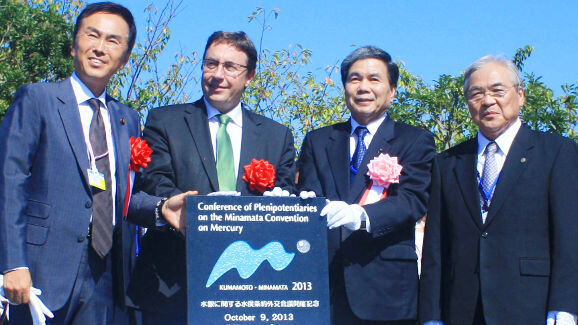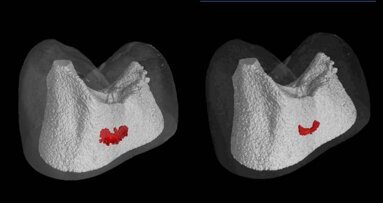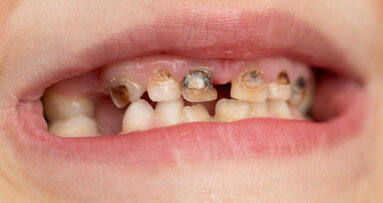LONDON – The British Dental Association (BDA) believes that the signing of a globally-binding treaty on the use of mercury is a sensible outcome that recognises the practicalities of improving oral health. The treaty was endorsed at a meeting in Minamata, Japan, on 10 October. It requires nations to phase down the use of dental amalgam fillings, of which mercury is a component, over an appropriate period of time.
The signing of the treaty follows years of discussion by the United Nations’ Environmental Programme’s Intergovernmental Negotiating Committee (UNEPINC). During those discussions BDA lobbying stressed the importance of avoiding a complete phase-out of the use of mercury in dentistry, particularly in a short timeframe. The BDA warned that more time is needed both for preventive oral health initiatives to be implemented and show results, and for suitable alternative filling materials to be developed.
BDA representatives Drs Stuart Johnston and Susie Sanderson, both members of the organisation’s Principal Executive Committee, led international lobbying on behalf of dental associations around the world. The final terms of the treaty were agreed at a meeting of UNEPINC held in Geneva in January.
Dr Johnston, who led the World Dental Federation Amalgam Task Team during the talks, said: “We welcome the fact that this treaty strikes a sensible balance between the very understandable imperative to reduce global mercury emissions and the need to have the tools available for dental professionals worldwide to continue the fight to improve oral health.
“It takes a holistic view that recognises both the unique contribution that dental amalgam – a hard-wearing, safe and long-lasting material used in dental restorations – makes in dentistry, while also acknowledging the importance of reducing mercury emissions from all sources, including from far more significant industries including coal burning and gold mining.
“Importantly, it also acknowledges the crucial role that preventive oral health programmes can make to reducing need and demand for fillings.”
MANCHESTER, UK: The British Dental Association (BDA) in London has announced that extra security measures have been put in place for its upcoming conference...
HARLOW, UK: Now that many questions regarding COVID-19, including its symptoms, risks and recovery time, have been answered, researchers are faced with a ...
BELÉM, Brazil/RUGBY, UK: A recent study has investigated the association between stroke and periodontitis, one of the most common human diseases affecting ...
MANDAUE, Philippines: Four volunteers working with Dentaid, a dental charity that provides essential dental care to people in the UK and to people in many ...
LONDON – British researchers have developed a device that takes the pain out of tooth decay treatment by electrically reversing the process to help ...
LONDON, UK/ZURICH, Switzerland: Inventor of the All-on-4 treatment concept Dr Paulo Malo from Portugal is only one of the world-renowned experts that has ...
KOBLACH, Austria: Amann Girrbach is all about supporting laboratories in the organisation of digital dental workflows. With the AG.Live digital platform, ...
LONDON, UK: The General Dental Council (GDC) yesterday announced it will publish details by the end of January on how it wants to change the current ...
Role models shape how dental students see the profession, their own potential and even their well-being. In a recent British Dental Journal special feature ...
EDINBURGH, Scotland: Fresh statistics from Public Health Scotland have revealed widening oral healthcare inequities in Scotland, and the British Dental ...
Live webinar
Tue. 24 February 2026
6:00 pm UTC (London)
Prof. Dr. Markus B. Hürzeler
Live webinar
Tue. 24 February 2026
8:00 pm UTC (London)
Prof. Dr. Marcel A. Wainwright DDS, PhD
Live webinar
Wed. 25 February 2026
4:00 pm UTC (London)
Prof. Dr. Daniel Edelhoff
Live webinar
Wed. 25 February 2026
6:00 pm UTC (London)
Live webinar
Thu. 26 February 2026
1:00 am UTC (London)
Live webinar
Tue. 3 March 2026
4:00 pm UTC (London)
Dr. Omar Lugo Cirujano Maxilofacial
Live webinar
Wed. 4 March 2026
1:00 am UTC (London)
Dr. Vasiliki Maseli DDS, MS, EdM



 Austria / Österreich
Austria / Österreich
 Bosnia and Herzegovina / Босна и Херцеговина
Bosnia and Herzegovina / Босна и Херцеговина
 Bulgaria / България
Bulgaria / България
 Croatia / Hrvatska
Croatia / Hrvatska
 Czech Republic & Slovakia / Česká republika & Slovensko
Czech Republic & Slovakia / Česká republika & Slovensko
 France / France
France / France
 Germany / Deutschland
Germany / Deutschland
 Greece / ΕΛΛΑΔΑ
Greece / ΕΛΛΑΔΑ
 Hungary / Hungary
Hungary / Hungary
 Italy / Italia
Italy / Italia
 Netherlands / Nederland
Netherlands / Nederland
 Nordic / Nordic
Nordic / Nordic
 Poland / Polska
Poland / Polska
 Portugal / Portugal
Portugal / Portugal
 Romania & Moldova / România & Moldova
Romania & Moldova / România & Moldova
 Slovenia / Slovenija
Slovenia / Slovenija
 Serbia & Montenegro / Србија и Црна Гора
Serbia & Montenegro / Србија и Црна Гора
 Spain / España
Spain / España
 Switzerland / Schweiz
Switzerland / Schweiz
 Turkey / Türkiye
Turkey / Türkiye
 UK & Ireland / UK & Ireland
UK & Ireland / UK & Ireland
 International / International
International / International
 Brazil / Brasil
Brazil / Brasil
 Canada / Canada
Canada / Canada
 Latin America / Latinoamérica
Latin America / Latinoamérica
 USA / USA
USA / USA
 China / 中国
China / 中国
 India / भारत गणराज्य
India / भारत गणराज्य
 Pakistan / Pākistān
Pakistan / Pākistān
 Vietnam / Việt Nam
Vietnam / Việt Nam
 ASEAN / ASEAN
ASEAN / ASEAN
 Israel / מְדִינַת יִשְׂרָאֵל
Israel / מְדִינַת יִשְׂרָאֵל
 Algeria, Morocco & Tunisia / الجزائر والمغرب وتونس
Algeria, Morocco & Tunisia / الجزائر والمغرب وتونس
 Middle East / Middle East
Middle East / Middle East


















































To post a reply please login or register